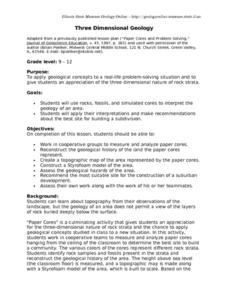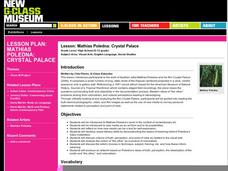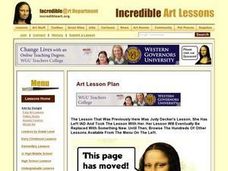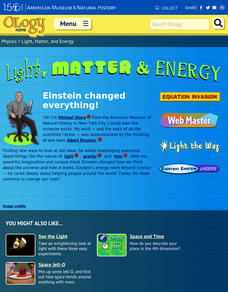Curated OER
A Sense of West Virginia
Students consider their perceptions of the world through their 5 senses while visiting the West Virginia State Museum. In this West Virginia history lesson plan, students discover how knowing about the past helps with their understanding...
Curated OER
Three Dimensional Geology
Here is a fine lesson plan on geology designed for high schoolers. Learners use rocks, fossils, and other geological clues to determine the geology of an area. Then, they make recommendations to a fictitious city council about the...
Curated OER
Lesson: Mathias Poledna: Crystal Palace
Film analysis takes critical thinking, connections, and context. Upper graders look at the film installation, Crystal Palace in terms of the film makers choices, presentation, and perspective of truth. After an analytical discussion...
Curated OER
Sizing Up the Supersize Croc
Students examine and compare traits of humans and crocodiles. In this crocodile instructional activity students use a ratio to estimate the height of a person and compare that to a crocodile.
Curated OER
Astronomy
Students examine a medieval manuscript on astronomy and create their own books based on modern discoveries in astronomy. In this astronomy lesson, students compare astronomy knowledge in the middle ages to today and research modern...
Curated OER
Timely Tolerance
Eighth graders work together to focus on an oppressed group of society. Using the information they gather, they create a museum exhibit to educate their community on the group. They present their PowerPoint presentation to the class to...
Curated OER
University of California Botanical Garden Field Trip
Students explore plant species and the climates and conditions in their environment. They explore this living museum on the Garden's thirty-four acres to encounter over 13,000 plant species from around the globe.
Curated OER
Impressionism
Eighth graders conduct Internet research as well as visit museum Web sites to become acquainted with the period of Impressionism. After completing their research, they sketch ideas for a landscape painting in the Impressionist style...
Curated OER
Rock Art and Ritual
Students explore, examine and determine what kinds of rock art motifs are likely the product of ancient ritual descent. They identify connections between rock art symbolism and Native American ritual practices. Each student also views a...
Curated OER
Narrow Road to the Interior
Students investigate the life and work of the Japanese poet, Matsuo Basho as the Japanese poetic forms are studied. Nature, symbolism, and history are probed as the lesson is developed.
Curated OER
Cultural Corner- "Mexico"
Students use print and electronic resources to gather information about Mexico. They present a mini-museum to share with students, parents, and other interested classes around the district. They present their information in a video...
American Museum of Natural History
Climate Change
It actually is possible to have too much of a good thing when it comes to climate change. A slide show lesson describes how burning fossil fuels contributes to climate change. Individuals read about the scientific process and the...
American Museum of Natural History
Paleontology Books
A list of 11 books about paleontology offers titles, authors, and a brief description of the tale.
American Museum of Natural History
DNA Detective
DNA is like the fingerprint of genetics. A quick lesson introduces the topic of DNA sequences with a mystery about an endangered species. The lesson shows how DNA extraction, replication, and sequencing often provide undeniable evidence...
American Museum of Natural History
Beyond Planet Earth
Scholars take a journey through space with 16 eye-catching images. Along the way, learners read captions starting with the moon, then move onto asteroids, Mars, and Jupiter.
American Museum of Natural History
Create a Coral Reef
Scholars create a diorama to showcase a vibrant coral reef. Six steps walk pupils through setting up the diorama box, crafting four different types of marine life, and putting it all together.
Curated OER
African Ceramic Portrait Vessel
Middle schoolers create a piece of art inspired by traditional African pieces.
American Museum of Natural History
The Amazing Mundo
Rocks and minerals are great on their own, but they also turn into some pretty amazing stuff! An online lesson explains the different types of materials we get from rocks and minerals, including glass, plastic, and coins. An embedded...
American Museum of Natural History
What's This?: Early Humans
Early humans crafted shelters out of whatever materials they could find. A one-question quiz asks learners to identify the type of bones used to construct the hut pictured in a display.
American Museum of Natural History
Fossils
Sixteen slides showcase an average day on the job for a paleontologist, Ross MacPhee. Engaging images include world maps and real-world photographs from an archeological dig in Antarctica. A brief description accompanies each slide.
American Museum of Natural History
Fascinating Fish
A fish is not just a fish. So many fish in remote places have unique characteristics. Take a trip with an ichthyologist to the Congo River to discover the species of one of the most diverse fish populations in the world. The online...
American Museum of Natural History
Pterosaurs: The Card Game
Piecing together the past is a challenging endeavor. Learners get a taste of that challenge as they play a game that incorporates several components such as trophic levels, geological time periods, and catastrophic events. Pairs work to...
Messenger Education
Snow Goggles and Limiting Sunlight
Why would someone need contact lenses that offer UV protection? With a 28-page packet full of instruction and worksheets, learners discuss solar radiation and its potential harm to eyes. They make snow goggles similar...
American Museum of Natural History
Light, Matter and Energy
Let Einstein's work shine the way. Pupils read about Einstein's iconic equation, E=mc^2, using a remote learning resource and see how ideas from other scientists such as Kepner, Curie, Galilei, and Newton led to its discovery. They...

























